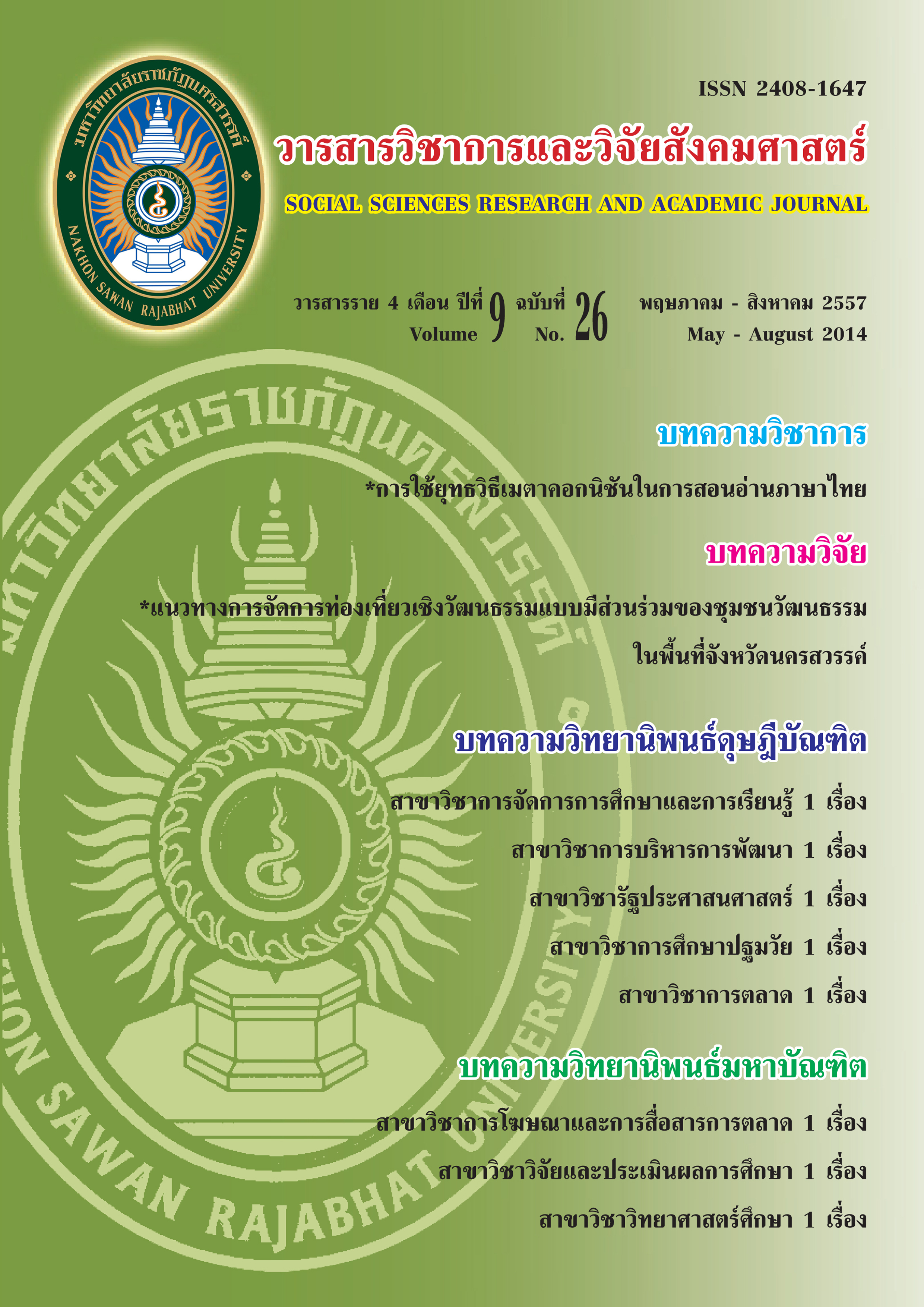การศึกษาองค์ประกอบและพัฒนาคุณลักษณะกัลยาณมิตร ของนักศึกษาการศึกษาปฐมวัย (A Study of Factors and KALAYANAMITT Characteristics Development of Early Childhood Education Program Students)
Main Article Content
Abstract
บทคัดย่อ
การวิจัยครั้งนี้มีวัตถุประสงค์เพื่อศึกษาองค์ประกอบและพัฒนาคุณลักษณะกัลยาณมิตรของนักศึกษา
สาขาการศึกษาปฐมวัย ด้วยรูปแบบการฝึกอบรม ISPAPA กลุ่มตัวอย่างที่ใช้ในการวิจัยเกี่ยวกับการศึกษาองค์ประกอบคุณลักษณะกัลยาณมิตรเป็นนักศึกษาสาขาการศึกษาปฐมวัยชั้นปีที่ 1-4 ของมหาวิทยาลัยราชภัฏในกลุ่มภาคกลาง จำนวน 500 คน ได้จากการสุ่มแบบแบ่งชั้น และกลุ่มตัวอย่างที่ใช้ในการพัฒนาคุณลักษณะกัลยาณมิตรของนักศึกษาสาขาการศึกษาปฐมวัยด้วยรูปแบบการฝึกอบรม ISPAPA ได้จากการเลือกแบบเจาะจง จำนวน 2 ห้องเรียน โดยแบ่งเป็นกลุ่มทดลอง 42 คน และกลุ่มควบคุมจำนวน 42 คน เครื่องมือที่ใช้ในการศึกษา
ครั้งนี้คือ รูปแบบการฝึกอบรม ISPAPA และแบบวัดคุณลักษณะกัลยาณมิตรของนักศึกษาสาขาการศึกษาปฐมวัย
ผลการวิจัย พบว่า
1. โมเดลคุณลักษณะกัลยาณมิตรของนักศึกษาสาขาการศึกษาปฐมวัยประกอบด้วย 7 องค์ประกอบ ได้แก่ ด้านความน่ารัก ด้านความน่าเคารพ ด้านความน่าเจริญใจ ด้านการรู้จักชี้แจงให้เข้าใจ ด้านการอดทนต่อถ้อยคำ
ด้านการอธิบายเรื่องต่างๆ ได้อย่างลึกซึ้ง และด้านการไม่ชักนำไปในทางที่เสื่อมเสียมีความเหมาะสมพอดีกับข้อมูล
เชิงประจักษ์ โดยน้ำหนักองค์ประกอบในแต่ละด้าน มีค่าเป็นบวกอย่างมีนัยสำคัญทางสถิติที่ระดับ .01 ทุกด้าน และสามารถวัดองค์ประกอบคุณลักษณะกัลยาณมิตรของนักศึกษาสาขาการศึกษาปฐมวัยได้
2. รูปแบบการฝึกอบรม ISPAPA เพื่อพัฒนาคุณลักษณะกัลยาณมิตรของนักศึกษาสาขาการศึกษาปฐมวัยประกอบด้วยขั้นตอนการฝึกอบรม 6 ขั้นตอน ได้แก่ ขั้นที่ 1 ขั้นสร้างแรงบันดาลใจ ขั้นที่ 2 ขั้นร่วมกันแบ่งปันประสบการณ์ ขั้นที่ 3 ขั้นกระทำการเรียนรู้ ขั้นที่ 4 ขั้นวิเคราะห์ ขั้นที่ 5 ขั้นฝึกปฏิบัติ และขั้นที่ 6 ขั้นวัดประเมิน
3. ผลการเปรียบเทียบค่าเฉลี่ยคุณลักษณะกัลยาณมิตรโดยรวมและรายด้าน ภายในกลุ่มทดลอง พบว่า หลังทดลองสูงกว่าก่อนทดลองอย่างมีนัยสำคัญทางสถิติที่ระดับ .01 และสูงกว่ากลุ่มควบคุมอย่างมีนัยสำคัญทางสถิติที่ระดับ .01
Abstract
The purposes of this research were to study factors and KALAYANAMITT characteristics development of Early Childhood Education Program students by ISPAPA training. The research subjects consisted of 500 1st - 4th year Early Childhood Education Program students of Rajabhat Universities in the central part of Thailand selected by stratified random sampling; two classes purposive sampling subjects were used for developing KALAYANAMITT Characteristics of Early Childhood Education Program by ISPAPA training program. They were divided into the experimental group of 42 students that were trained by ISPAPA training program, and the control group of 42 students that were trained by the normal training program provided by the Early Childhood Education Program. The research instruments were ISPAPA training program, and an assessment test of KALAYANAMITT characteristics of Early Childhood Education Program students.
The results of the research were concluded as follows:
1. The model of KALAYANAMITT characteristics of Early Childhood Education Program students, the models to be analyzed, comprised 7 factors: endearing, respectable, pleasing, effective speaking, patience to words, profound expounding, and not inducing to wrong ways. The model of KALAYANAMITT characteristics of Early Childhood Education Program students was appropriate and consistent with the empirical data. The loading of each factor was positive with a statistical significance at the level of .01 and all factors of KALAYANAMITT characteristics of Early Childhood Education Program students were able to be assessed.
2. The ISPAPA training program to develop KALAYANAMITT characteristics of Early Childhood Education Program students consisted of 6 stages: 1) creating inspiration, 2) sharing experiences, 3) implementing, 4) analzing, 5) practicing and 6) assessing.
3. According to the comparison of means of KALAYANAMITT characteristics in general in individual areas, it was found that the means after the experiment were higher than those before the experiment with statistical significance at the level of .01 within the experimental group, and were higher than those of control group with statistical significance at the level of .01


